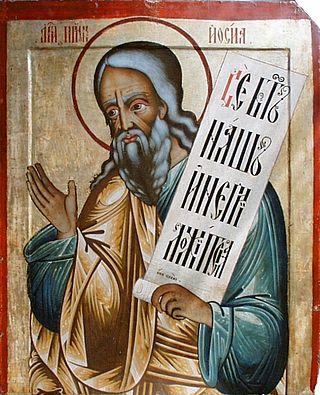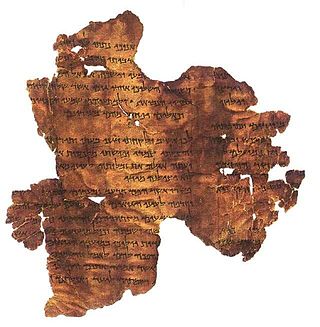Related Research Articles

In the Hebrew Bible, Hosea, also known as Osee, son of Beeri, was an 8th-century BCE prophet in Israel and the nominal primary author of the Book of Hosea. He is the first of the Twelve Minor Prophets, whose collective writings were aggregated and organized into a single book in the Jewish Tanakh by the Second Temple period but which are distinguished as individual books in Christianity. Hosea is often seen as a "prophet of doom", but underneath his message of destruction is a promise of restoration. The Talmud claims that he was the greatest prophet of his generation. The period of Hosea's ministry extended to some sixty years, and he was the only prophet of Israel of his time who left any written prophecy. Though its date is contested among scholars, the current trend is to date much of the book to postmonarchical times, authored particularly in Persian Yehud.
According to the Talmud, there were 48 prophets and 7 prophetesses of Judaism The last Jewish prophet is believed to have been Malachi. In Jewish tradition it is believed that the period of prophecy, called Nevuah, ended with Haggai, Zechariah and Malachi at which time the "Shechinah departed from Israel".

Hosea 1 is the first chapter of the Book of Hosea in the Hebrew Bible or the Old Testament of the Christian Bible. This book contains the prophecies attributed to the prophet Hosea, son of Beeri, and this chapter especially sets forth the spiritual whoredom of Israel by symbolical acts. It is a part of the Book of the Twelve Minor Prophets.

Hosea 3 is the short, third, chapter of the Book of Hosea in the Hebrew Bible or the Old Testament of the Christian Bible. This book, part of the Book of the Twelve Minor Prophets, contains the prophecies attributed to the prophet Hosea, son of Beeri, and this chapter refers autobiographically to Hosea's marriage to a woman who is an adulterer. His purchase of her from a paramour is treated in the Jamieson-Fausset-Brown Bible Commentary as a symbol of "Israel's condition in their present dispersion, subsequent to their return from Babylon".

Hosea 4 is the fourth chapter of the Book of Hosea in the Hebrew Bible or the Old Testament of the Christian Bible. This book contains the prophecies attributed to the prophet Hosea, son of Beeri. In this chapter he reproves the people and priests for their sins in the interregnum following Jeroboam's death; hence there is no mention of the king or his family; and in Hosea 4:2 bloodshed and other evils usual in a civil war are specified. It is a part of the Book of the Twelve Minor Prophets.

Hosea 5 is the fifth chapter of the Book of Hosea in the Hebrew Bible or the Old Testament of the Christian Bible. In the Hebrew Bible it is a part of the Book of the Twelve Minor Prophets. The book contains the prophecies attributed to the prophet Hosea, son of Beeri, and this chapter is about God's judgments against the priests, the people, and the princes of Israel, for their multiple sins, until they repent, a topic which continues to chapter 6.

Hosea 6 is the sixth chapter of the Book of Hosea in the Hebrew Bible or the Old Testament of the Christian Bible. In the Hebrew Bible it is a part of the Book of the Twelve Minor Prophets. This chapter contains prophecies attributed to the prophet Hosea, son of Beeri, including an exhortation to repentance and a complaint against Israel and Judah for persisting still in their wickedness.

Hosea 7 is the seventh chapter of the Book of Hosea in the Hebrew Bible or the Old Testament of the Christian Bible. In the Hebrew Bible it is a part of the Book of the Twelve Minor Prophets. The book contains the prophecies attributed the prophet Hosea, son of Beeri, and this chapter is about Israel reproved for multiple sins resulting in God's wrath against them for their hypocrisy.

Hosea 8 is the eighth chapter of the Book of Hosea in the Hebrew Bible or the Old Testament of the Christian Bible. In the Hebrew Bible it is a part of the Book of the Twelve Minor Prophets. This chapter contains prophecies attributed to the prophet Hosea, son of Beeri, about the impending destruction of Israel and Judah for their impiety and idolatry.

Hosea 9 is the ninth chapter of the Book of Hosea in the Hebrew Bible or the Old Testament of the Christian Bible. In the Hebrew Bible it is a part of the Book of the Twelve Minor Prophets. This chapter contain prophecies attributed to the prophet Hosea, son of Beeri, about the distress and captivity of Israel for her sins, especially for committing idolatry.

Hosea 10 is the tenth chapter of the Book of Hosea in the Hebrew Bible or the Old Testament of the Christian Bible. In the Hebrew Bible it is a part of the Book of the Twelve Minor Prophets. This chapter contains prophecies attributed to the prophet Hosea, son of Beeri, dated by the Jamieson-Fausset-Brown Bible Commentary to the period between Shalmaneser V's first and second invasions of Israel. Israel is reproved and threatened for its impiety and idolatry, and exhorted to repentance.

Hosea 11, the eleventh chapter of the Book of Hosea in the Hebrew Bible or the Old Testament of the Christian Bible, has been called "one of the high points in the Old Testament". In the Hebrew Bible is a part of the Book of the Twelve Minor Prophets. According to the Jamieson-Fausset-Brown Bible Commentary, this chapter contains prophecies attributed to the prophet Hosea, son of Beeri, about God's former benefits, and Israel's ingratitude resulting in punishment, but God still promises restoration.

Hosea 12 is the twelfth chapter of the Book of Hosea in the Hebrew Bible or the Old Testament of the Christian Bible. In the Hebrew Bible it is a part of the Book of the Twelve Minor Prophets. This chapter contains prophecies attributed to the prophet Hosea, son of Beeri, delivered about the time when the Kingdom of Israel (Ephraim) sought the aid of the Egyptian king So, in violation of her covenant with Assyria. References to contemporary events sit alongside allusions to the patriarchal age in Israel's history. Hosea exhorts the country's leaders to follow their father Jacob's persevering prayerfulness, "which brought God's favor upon him". The Jamieson-Fausset-Brown Bible Commentary notes that "as God is unchangeable, He will show the same favor to Jacob's posterity as He did to Jacob, if, like him, they seek God".

Hosea 14 is the fourteenth and final chapter of the Book of Hosea in the Hebrew Bible or the Old Testament of the Christian Bible. In the Hebrew Bible it is part of the Book of the Twelve Minor Prophets. This chapter concludes the prophecies attributed to the prophet Hosea, son of Beeri, with an exhortation to repentance, a promise of God's blessing, and a concluding verse resembling the wisdom tradition.

Ezekiel 10 is the tenth chapter of the Book of Ezekiel in the Hebrew Bible or the Old Testament of the Christian Bible. This book contains the prophecies attributed to the prophet/priest Ezekiel, and is one of the Books of the Prophets. In this chapter, Ezekiel sees "God's Glory depart from the Temple".

Ezekiel 17 is the seventeenth chapter of the Book of Ezekiel in the Hebrew Bible or the Old Testament of the Christian Bible. This book contains the prophecies attributed to the prophet/priest Ezekiel, and is one of the Books of the Prophets. This chapter tells, and then interprets, the riddle of the great eagle. The original text of this chapter is written in the Hebrew language. This chapter is divided into 24 verses.

Ezekiel 20 is the twentieth chapter of the Book of Ezekiel in the Hebrew Bible or the Old Testament of the Christian Bible. This book contains the prophecies attributed to the prophet/priest Ezekiel, and is one of the Books of the Prophets. In chapters 20 to 24 there are "further predictions regarding the fall of Jerusalem". In this chapter, Ezekiel speaks on God's behalf to some of the elders of Israel.

Ezekiel 33 is the thirty-third chapter of the Book of Ezekiel in the Hebrew Bible or the Old Testament of the Christian Bible. This book contains the prophecies attributed to the prophet/priest Ezekiel, and is one of the Books of the Prophets. This chapter opens the third and final section of the book, in which God's future blessings on Israel are proclaimed. A "complex interweaving of themes imported from the first twenty-four chapters of the book" is concerned with the concept of responsibility, including Ezekiel's own responsibility as a "watchman", and "the people's responsibility for their own moral and religious choices".

Ezekiel 43 is the forty-third chapter of the Book of Ezekiel in the Hebrew Bible or the Old Testament of the Christian Bible. This book contains the prophecies attributed to the prophet/priest Ezekiel, and is one of the Books of the Prophets. Chapters 40-48 give the ideal picture of a new temple. This chapter contains Ezekiel's vision of the glory of God returning into the temple, Ezekiel 43:1-6; God promises to dwell there, if the people will put away their sins, Ezekiel 43:7-9; to incite them to repentance, the prophet shows them the model and law of the house, Ezekiel 43:10-12; the measures of the altar, Ezekiel 43:13-17; the ordinances thereof, Ezekiel 43:18-27.

Ezekiel 46 is the forty-sixth chapter of the Book of Ezekiel in the Hebrew Bible or the Old Testament of the Christian Bible. This book contains the prophecies attributed to the prophet/priest Ezekiel, and is one of the Books of the Prophets. The final section of Ezekiel, chapters 40-48, give the ideal picture of a new temple. The Jerusalem Bible refers to this section as "the Torah of Ezekiel". In particular, chapters 44–46 record various laws governing the rites and personnel of the sanctuary, as a supplement to Ezekiel's vision.